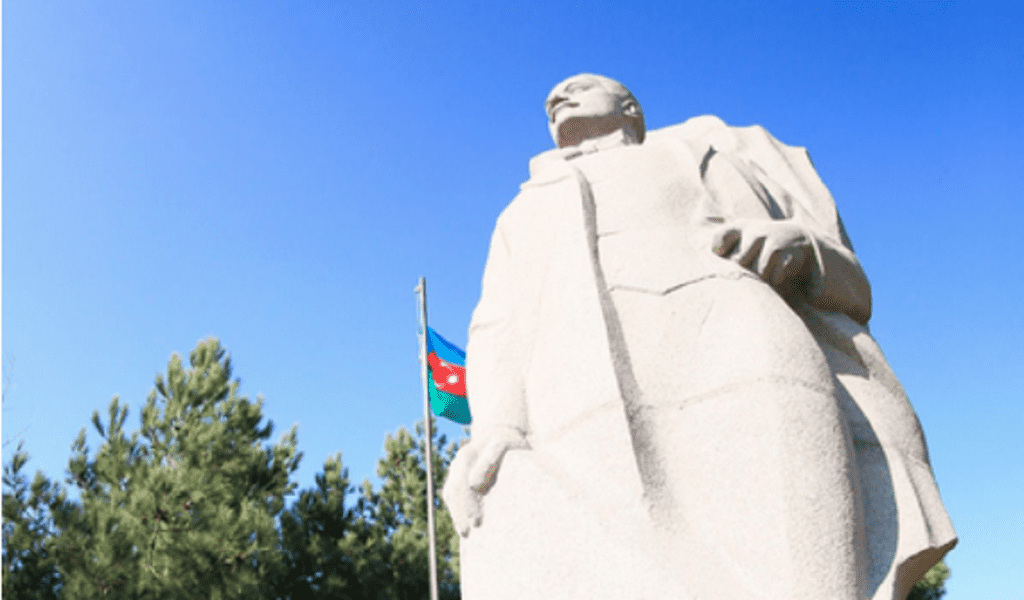By David Davidian
A little over a month ago, a major documentary on the person Baku calls the “Father of Azerbaijan,” Mammad Amin Rasulzade, was mysteriously canceled from an Azerbaijan-wide airing on AzTV.

One can only speculate on the cancellation — but there is a leading hypothesis. Even if a less than a complete documentary were prepared, it would be necessary to expose Rasulzade’s dealings with Adolf Hitler and Nazi Germany on behalf of Soviet Azerbaijani aspirations outside official Soviet policy. Rasulzade had a significant role in the formation of the 1918 Azerbaijani Republic. He fled after the Soviet Red Army absorbed Azerbaijan in 1920.
How one dealt with Hitler or the Nazis has become a selective tool of contention between competing interest groups. If we were to judge entire nations on their relations with fascism or Adolph Hitler in particular, most of Europe would be guilty. The irony is that Adolph Hitler was Time Magazine’s Man of the Year in 1938. Another irony, yet very real, is that even though over twenty million Soviets died in WWII, including 14 million soldiers or those whose status is still unknown, prisoners of war (POWs) from certain Soviet republics were recruited into the Waffen SS. Of interest are the 30,000 Georgians, 33,000 Armenians, and 70,000 Azerbaijanis. However, the Azerbaijanis formed one of the foreign units of the Wehrmacht, meaning they were part of the German military, almost like native German soldiers. This unit was formed in December 1941 as the Muslim Caucasus Legion but in 1942 it was reorganized into two separate legions, the North Caucasian Legion and the Azerbaijani Legion. The latter was composed of Soviet Azerbaijani POWs but included other Muslims from the Caucasus region. Later, some of these Azerbaijani POWs joined the Waffen SS.
Azerbaijani President Ilham Aliyev and specific regional supporters make much of one particular Armenian Legion leader, Garegin Nzhdeh, while ignoring those more important to Adolf Hitler and the Nazi war effort. One of those of importance was Mammad Amin Rasulzade. Consider the following from the Azerbaijani International Magazine, August 1999, page 24,
“It wasn’t long until Hitler started looking for someone to represent him in the Transcaucasian region. He couldn’t find anyone suitable among the Armenians or Georgians but had heard that Rasulzade was highly educated and cultured.”
Azerbaijani President Ilham Aliyev used the raising of a statue of Garegin Nzhdeh in Yerevan, Armenia in 2017, to lambast Armenians as Nazis. In spite of Aliyev’s claims against Armenians, a major street in the Azerbaijani capital, Baku, is named after Mammad Amin Rasulzade. Azerbaijani postage stamps were issued in honor of Rasulzade. The 1993 and 1999 thousand Azerbaijani manat bills have an image of Rasulzahe. Several statues have been erected in honor of Rasulzade across Azerbaijan, in Novkhani, Zagatala, and Ganja.

Garegin Nzhdeh worked with the Germans to circumvent the Turks from invading the Caucasus upon joining the German-Axis side during WWII, which they would have if the Nazis were winning. Nzhdeh helped prevent Nazi racial laws from going into effect against Armenians. The Nazi ideologist Alfred Rosenberg referred to the Armenians and Jews as “the peoples of the wastes.” In a declaration by the German High Command, “the Armenians were even worse than the Jews.” The former in Der Mythus des Zwanzigsten Jahrunderts (Munich 1930, p. 213), the latter in The Myth of the Master Race: Alfred Rosenberg and Nazi Ideology (Robert Cecil, London, 1972, p. 200). Eventually, the Armenians were “cleared.”
In contrast, Rasulzade’s goals were more ambitious. Rasulzade established relations with the Nazis in the 1930s while residing in Romania. At the outbreak of WWII, the German representatives notified Romanian authorities that Rasulzade was their political ally and asked that Rasulzade be issued documents permitting ease of diplomatic passage to Berlin. Rasulzade’s goal was to help Nazi Germany conquer the Caucasus or have Turkey as an ally of Germany do so, clearing the way for an independent Azerbaijan and probably destroying what remained of Armenia. Both Rasulzade and Nzhdeh tried using the Nazis for diametrically opposing ends. Luckily for Armenia, Hitler was defeated.
In May 1942, Rasulzade participated in meetings between Nazis and representatives of Caucasian Muslim emigres and actively recruited legionnaires for the German Wehrmacht from among Azerbaijani POWs. As WWII dragged on, Rasulzade fell out of active favor with the Nazis. Some claim Rasulzade was too ambitious for Nazi designs in the Caucasus; others say the Nazis had more important issues to address as the war was turning against Germany. Interestingly, Rasulzade remained in Germany until 1947. He eventually resided in Turkey until he died in 1955.
In a United Kingdom War Office archive (WO 208/4367), we find the following quote from Adolf Hitler given on December 12, 1942, at Wolfsschanze, regarding Georgians and Armenians, but expresses his view on Muslim Turkic peoples,
“The Georgians are not a Turkish people, rather a typical Caucasian tribe, probably even with some Nordic blood in them. Despite all explanations – either from Rosenberg or from the military side – I don’t trust the Armenians, either. I consider the Armenian units to be just as unreliable and dangerous. The only ones I consider to be reliable are the pure Muslims, which means the real Turkish nations.”
The efforts of Rasulzade and Soviet Azerbaijani military defectors such as Major Abdurrahman Fatalibeyli, the eventual leader of the Azerbaijani Nazi Legion and head of the Azerbaijani National Committee in Berlin were significant. So much so that the Azerbaijani soldiers of the Aserbaidschanische Feld-Bataillon I./111 participated in suppressing the August 1944 Warsaw Uprising that killed an estimated 40,000 civilians.
In support of the leading hypothesis explaining the cancellation of this AzTV documentary, one must publicly account for Rasulzade’s activity between 1921 and the end of WWII. It was easier to cancel the documentary because those years cannot simply be airbrushed out of existence. Azerbaijanis claiming Armenians are fascist Nazis have brought a new meaning to the proverb about those who live in glass houses.
Yerevan, Armenia
Author: David Davidian (Lecturer at the American University of Armenia. He has spent over a decade in technical intelligence analysis at major high technology firms. He resides in Yerevan, Armenia
(The views expressed in this article belong only to the author and do not necessarily reflect the editorial policy or views of World Geostrategic Insights).







